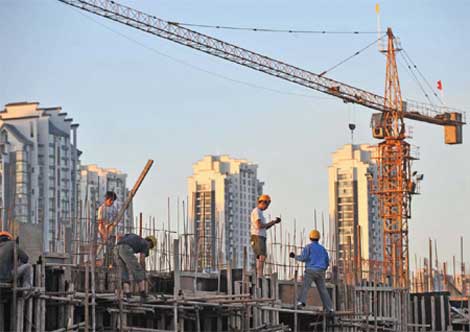Uncorking the real(ty) value
Updated: 2011-07-08 11:09
By Yang Yang (China Daily European Weekly)
 |
|
A property project under construction in Shenyang. Foreign investment in the property sector grew 57.3 percent year-on-year during the first five months of this year. Sun Hai / for China Daily |
Foreign investors are betting big on property projects in second-and third-tier cities
Second- and third-tier cities are expected to reap maximum gains from China's ongoing urbanization drive with property projects in these regions increasingly catching the fancy of overseas investors.
Property prices have been on the boil for some time in China with demand far outpacing supply as prices head north, prompting fears of asset bubbles. Though the government took steps to cool down the investment frenzy, it has in no way diminished the allure for prime space in smaller cities.
By 2020, many of the first-tier cities like Shanghai, Beijing, Guangzhou and Shenzhen will only account for 10 percent of the commercial property market, says a report from property consultancy Jones Lang LaSalle.
That means that in the next 10 years there will be huge opportunities in second- and third-tier cities, the report says.
Much of the foreign investment interest in China's property sector comes in the form of private equity (PE) investments in real estate projects.
According to data from the National Bureau of Statistics (NBS), during the first five months of this year, foreign investment in the property sector grew 57.3 percent year-on-year to 26.6 billion yuan (2.84 billion euros).
That the appetite for such investments continues to remain strong is clearly indicated in the growth rates for the first quarter and the first four months, up 45.2 percent and 62.3 percent. Compared with the total investment in the property sector during the first five months, which grew only 34.6 percent, foreign investment has risen much faster.
Most of the major property companies in China saw the proportion of foreign investment in financing rise from 25 percent in 2010 to 39 percent during the first quarter of this year, says a report from E-house China R&D Institute in Shanghai, based on the financial records of 83 companies.
Although first-tier cities are still the main destination for foreign investment, foreign funds have started to shift their attention to second-tier cities, especially in provincial capitals and developed eastern coastal cities like Suzhou in East China's Jiangsu province and Dongguan in South China's Guangdong province, says He Tian, deputy head of the Research Center of the China Index Academy.
Other than traditional first-tier cities, second-tier cities such Shenyang and Dalian are now the main focus of foreign investment, says the Jones Lang LaSalle report.
In September 2010, US-based private equity firm Blackstone Group LP decided to invest in high-end hotel and residential projects in Dalian, Northeast China's Liaoning province.
In June this year, Euro Sino Invest GmbH (ESI), a Hong Kong-registered German company specializing in introducing funds from Germany into the residential real estate market of second- and third-tier Chinese cities, said it has invested in a project in Shenyang, capital of Northeast China's Liaoning province.
The company and its Chinese partner Dalian Wanheng Real Estate Development Co Ltd will invest 700 million yuan for the project, dubbed the "Noble Mansion", with the bulk of the funds coming from Germany.
MGPA, a private equity real estate investment advisory company that manages $11 billion (7.67 euros) in assets in Europe and Asia, said recently that its MGPA Asia Fund III had acquired a 50-percent interest in Galleria Chengdu.
What is surprising is that much of the investment has come even as international ratings agencies have downgraded their outlook on the Chinese property sector over fears of an imminent downturn.
Ratings agency Standard and Poor's (S&P) in a report released on June 15 said that in the next six to 12 months, prices of new houses will decline by nearly 10 percent in China. S&P cut its expectation for the property development sector to "negative" from "stable" in view of the tightening credit conditions.
In April, Moody's Investors Service also downgraded its rating on China's real estate sector to "negative" from "stable".
"The Chinese government is doing a great job in fighting bubbles. All the measures introduced during the past four years have macro-managed the market well," says Florian Schmied, managing director of ESI.
"In the short run, the real estate market will decline, especially in the second half of the year due to the stringent regulations. But in the long run, the property market will see a new round of growth after two to three years as the economy is expected to continue its fast growth pace," says He Tian.
"It is perhaps a good time to invest as people are anticipating a low trough for real estate market during the second half of the year."
From an investment perspective, second-tier cities have innumerable advantages.
Compared with the highly urbanized top-tier cities, second-tier cities including Shenyang still have a long way to reach these levels.
At present, China's urbanization ratio is 47 percent, and by 2020 it will be 70 percent, which means nearly 300 million suburban residents are going to move to cities in the next 15 to 20 years, says Michael Rotter, deputy head of section for economic cooperation and development at the German Embassy in Beijing.
The urbanization brings "important opportunities for German and European companies to invest in and develop China's property sector", he says.
ESI says cities like Shenyang have vast untapped potential. Shenyang has 7.2 million in population and its surrounding areas consist of an additional 13 million inhabitants.
Beside the "Noble Mansion" project, ESI released on Dec 6 a fund offer worth 30 million euros, which will focus on residential real estate in second- and third-tier emerging cities in China.
The advantages of second- and third-tier cities will be enhanced as China builds its national high-speed rail network.
"We believe western China merits close attention because the new high-speed rails are expected to have a dramatic effect on this region," says John Saunders, CEO of MGPA Asia, excluding Japan.
The huge commercial value of second-tier cities is another attraction for investors.
China will overtake the United States by 2020 to be the world's largest consumer market, according to a recent report released by Credit Suisse.
The second- and third-tier cities have been included in the latest expansion plan of big retailers including Ikea, according to CBRE, the world's largest commercial real estate broker.
Wang Zhe, general manager of Tianjin-based Lecheng Real Estate Co Ltd, says a considerable number of foreign real estate funds have approached his firm about the possibility of a stake investment.
"Obviously, they are betting on the huge growth potential of China's retail sector, and thus the opportunity of a higher yield from investment in commercial property," Wang says.
"Another advantage of the second-tier cities is that the economic growth of some cities is higher than Beijing or Shanghai and the property prices still have comparatively more scope to increase," says Zhou Ganghua, a researcher at the Center for Real Estate Study of Hangzhou-based Zhejiang University.
In second- and third-tier cities, the cost of land is relatively lower and regulations more relaxed.
A DTZ report on global real estate investment in 2011 says that $104 billion will flow to the Asia-Pacific market, up 45 percent compared to 2010.
"I think the appreciation of the yuan against the US dollar is one of the reasons for foreign capital growing faster in China's property sector," says He Tian.
E-paper

Burning desire
Tradition overrides public safety as fireworks make an explosive comeback
China calling
School of hard knocks
Pen mightier than the sword
Specials

90th anniversary of the CPC
The Party has been leading the country and people to prosperity.

My China story
Foreign readers are invited to share your China stories.

Green makeover
Cleanup of Xi'an wasteland pays off for ancient city
